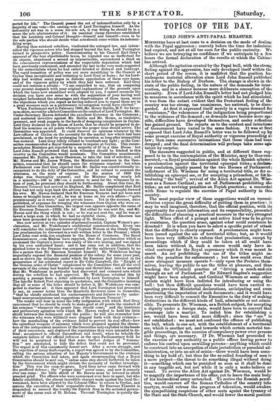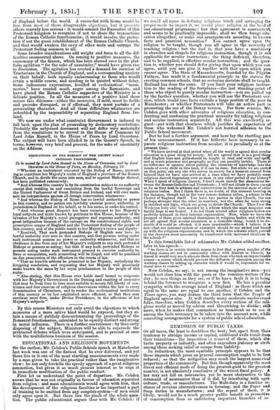TOPICS OF THE DAY.
LORD JOHN'S ANTI-PAPAL MEASURE.
Mrienerens have at last come to a decision on the mode of dealing- with the Papal aggression • scarcely before the time for indecision had expired, and not at all too soon for the public curiosity. We believe we are betraying no confidence if we anticipate by a few hours the formal declaration of the results at which the Cabinet has arrived.
Although the agitation created by the Papal bull, with the strong feeling against the aggression, has only developed itself within the short period of the recess, it is manifest that the position has undergone material alteration since Lord John Russell published his letter to the Bishop of Durham. The change is shown in the state of the public feeling, in the nature of the demands for inter- vention, and in a clearer because more deliberate conception of the necessity. Even if Lord John Russell's letter had not pledged him to measures in accordance with the spirit which he had stimulated, it was from the outset evident that the Pretestant feeling of the country was too strong, too unanimous, too national, to be disre- garded. At first it expressed itself merely in a vague demand for "resistance," the vehemence of the indignation being proportioned to the wideness of the demand ; as demands have become more spe- cific, difficulties have developed themselves, and cooler reflection has gained ground. The reports as to the conduct and intentions of Government have varied in the same fashion. It was at first supposed that Lord John Russell's letter was to be followed up by some prompt exercise of Royal authority or vigorous proceeding st law ; then came successive intimations that these• ideas had been
• dropped ; and the final determination will perhaps take. some agi-
tators by surprise. • The measures suggested in public, and at different limes sup- posed to be in the contemplation of the Minister, may be thus enu- merated,—a Royal proclamation against the whole Romish scheme; a proclamation against the territorial episcopal titles ; a declass- tory resolution, jointly passed by the two Hoopes of Parliament; indictment of Dr. Wiseman for using a territorial title, or for es- tablishing an episcopal see, or for accepting a princedom or for in- troducing "the bull" ; revival of the Alien Act against br. Wise- man as a Roman Cardinal; an act of Parliament prohibiting -the titles; an act reviving penalties on Popish practices ; a concordat with Rome to regulate the exercise of Papal authority in this country.
The most popular view of these suggestions would on reconsi- deration expose the great difficulty of putting them in practice : at may be well imagined, therefore, that the official position, with its opportunity for exact information and its responsibility, presented the difficulties of planning a practical measure in the very strongest light. When effect of a prompt and active kind was to be given to resistance, the question arose, against what could resistance be directed? It is when you have to select a specific point of attack that the difficulty is dearly exposed. A proclamation might have been issued against the use of territorial titles; but, as it would have been very difficult to enforce that proclamation, except by proceedings which if they could be taken at all could have been taken without it, such a course would only have in- vited contempt for the Royal supremacy which it was meant to assert. An act prohibiting the use of the titles might in- clude the penalties for enforcement ; but how could even that more stringent measure operate ?—only upon the Prelates them- selves, leaving the public to use the titles at pleasure, and thus teaching the O'Connell practice of "driving a coach-and-six through an act of Parliament." Sir Edward Sugden's suggestion might have been adopted, and Cardinal Wiseman or some other prelate might have been indicted for introducing or using the bull : but then difficult questions would have been excited re- specting previous Ministerial declarations, anticipating and even sanctioning the importation of such documents ; and it would have been very difficult to commit the Executive to the duty of making distinctions in the different kinds of bull, admissible or not admis- sible. To prosecute Dr. Wiseman, as a British subject, for accepting a dignity under a- foreign state, would have been to convert that personage into a martyr. To indict him for establishing a see, would have been still more difficult ; since the " see " is not established : we must not confound the offence of publishing the bull, which is one act, with the establishment of a territorial see, which is another act, and towards which certain material tan- gible proceedings, in the exercise of compulsory power over persons and things, are necessary. If Dr. Wiseman had proceeded to the exercise of any authority as a public officer having power to enforce his control upon unwilling persons—anything which could be construed into an usurpation of state jurisdiction or parochial ad- ministration, -or into an act of seizin—there would have been some- thing to lay hold of; but thus far the so-called founding of sees is a mere project—the threat to do something illegal without doing it—something which can be punished as soon as it shall be done in any tangible act, but not while it is only a make-believe or vaunt. To revive the Alien Act against Dr. Wiseman, would be to magnify the importance of his office, yet to leave the main body of his hierarchical army untouched. To revive the Romish penal- ties, would convert all the Roman Catholics of the country ink martyrs, would retrace the progress of toleration, would awaken the sympathizing suspicions of other sects againt the tyranny of the State and the State Church, and would. lower the moral poeition
of England before the world. A conoordat with -Rome would be free from most of these disagreeable objections, but it presents others scarcely less serious : it would commit the Executive of this Protestant kingdom to recognize if not to share the transactions of the Roman Catholic functionaries ; it would involve the protec- tion if not the quasi establishment of the Roman Catholic Church, and that would awaken, the envy of other sects and-outrage the Protestant feeling common to all. Some broader considerations add weight and farce to all the dif- ficulties enumerated above. On coming to positive measures, the supremacy of the Queen, which has been slurred over in the plat- form agitation "for the sake of unanimity," would have given rise to discussion. The agitation has created a demand for coercion of Tractarians in the Church of England, and a corresponding anxiety on their behalf ; both equally embarrassing to those who would retain a middle course, and needing to be quieted without delay. Some indecorous expressions, levelled at ecclesiastical "mum- meries," have created much anger among the B.omanists and have placed the Roman Catholic supporters of the Ministry in a delicate Position. In all the measures of a positive kind there occurs this dilemma—either the measures, if mild; must be feeble and provoke disregard, or if effectual, they must partake of a persecuting character. And all these -difficulties whatsoever are redoubled by the impossibility of separating England from Ire- land. We now see under .what constraint Clovexnment is induced to fall back upon the plan of proceeding by declaratory resolutions. Probably: subjoined document will not differ very materially from the resolutions to be moved in the House of Commons by Lord John Russell, in the Reuse. of Pee.rs by Lord Overstone. The subject will have been alluded to in the Queen's Speech, in terms, however, very brief and general, for the sake of unanimity on the Address.
1133SOLTYPIONS ON THE SUBJECT OF THE RECENT ROMAN CATHOLIC PROCEEDINGS,
To be moeed by Lend Mot Russell in the House of Comment, and by Lord Overgone in thelfouse of Terre, on Monday, February 10.
"Whereas an instrument- executed by the Bishop of Rome' pretend- ing to constitute her Majesty's feiihn of England a province of the Roman 'Church, and to divide the same into sees, and to appoint Bishops thereof, has been published extensively.; "And whereas this country is by ita oorostitution subject to no authority except that residing in and emanating from the lawful Sovereign and -the United Parliament lei' Great Britain and Ireland, and will ever main- tain its independence against all foreign intervention whatsoever : "And whereas the Bishop of Rome has no lawful authority or power in this country, and no person can lawfully exercise power, authority, or jurisdietionin England on his behalf, or in his name, or under his control :
"And whereas great disquiet has been occasioned to her Majesty's loyal subjects and made known by petitions to this House, because of the invasion of her Majesty's royal prerogative and supreme authority, and -greet indignation because of the outrage on the constitutional rights and prescriptive usages of England and the Protestant feeling of the people of this country, and of the public insult to her Majesty's crown and dignity :
"Resolved, That such pretended Bishops of English sees have no lawful authority over sees in this country, and that persons acting under such instrument possess no power or authority whatsoevef, and that no Obedience is due from any other Majesty's subjects to any such pretended Bishops or persons so acting; but that if any such pretended Bishops or persons acting under such instrument proceed to exercise authority by force or compulsion, such proceeding will be illegal, and will be punished on due prosecution of the offenders in the courts of law. "That an humble address be presented to her Majesty, embodying the _foregoing resolution, and requesting that her Majesty will graciously ,make known the same by her royal proclamation to the people of this _realm : " Also stating, that this House ever holds itself bound to e,oiiperate With her Majesty's Government in the framing and enacting of measures that may be from time to time most suitable to secure full liberty of con- science and free exercise of religions observances within the law to every 'denomination of Christians' -and ter render the ecclesiastical institutions of this country as by law established more efficient, so that they may -continue more firm, wader Divine Providence, in the affections of her Majesty's subjects."
_ By this course Ministers not only avoid the objections to which ,measures of a mare motive kind would be exposed, but they at- tain a means of publicly discountenancing the proceedings of the Romanist functionaries coagulated to be equally distinct and strong .in moral influence. There is a further convenience : by thus early disposing of the subject, Ministers will be able to supersede the protracted debates which were anticipated, and to proceed at once With the multifarious business of the session.



























 Previous page
Previous page